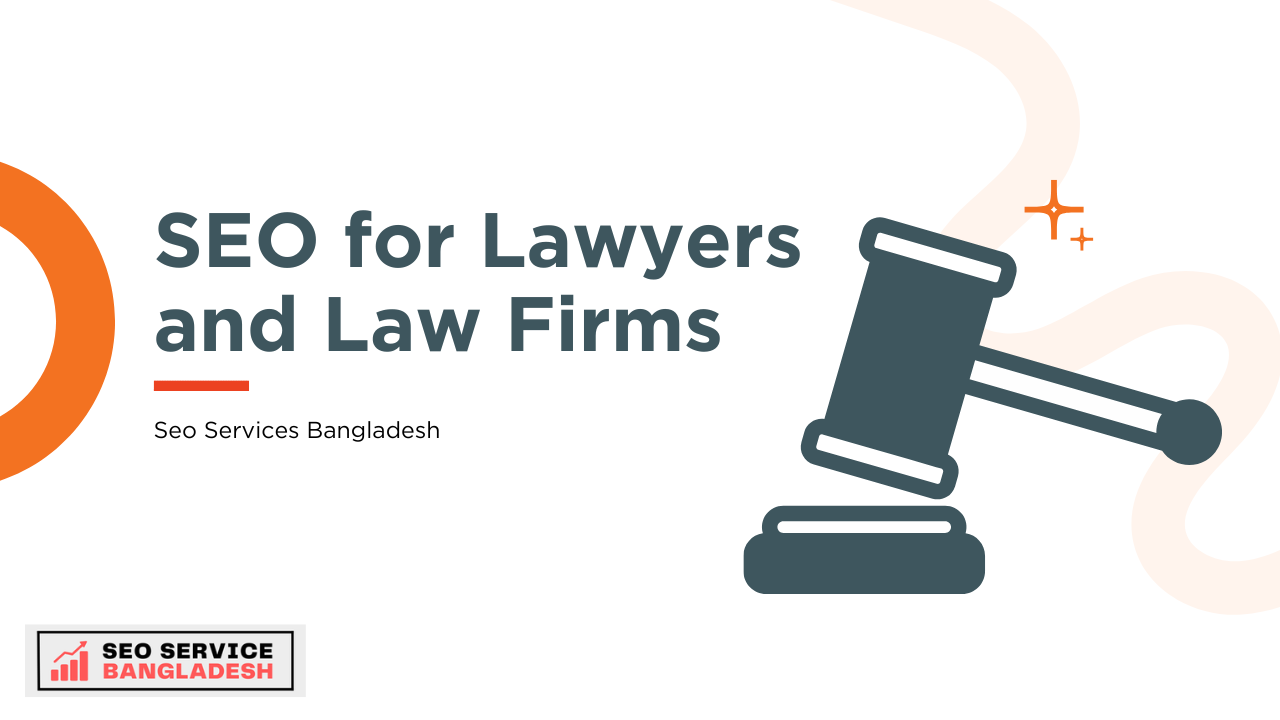If your law firm doesn’t appear on Google, it might as well not exist.
The new generation of people in Bangladesh now searches online for legal help, not through referrals or ads. If your firm isn’t visible in search results, you’re losing clients to competitors who are.
Let’s be honest:
- Your website isn’t generating leads.
- Your clients can’t find you on Google.
- You’ve trusted a freelancer, but the results never came.
- You’re still unsure how digital marketing works — and that hesitation is costing you business.
In this Law firm SEO guide, I will break down the SEO process in easy-to-follow steps to help Bangladeshi lawyers attract more clients, build trust online, and grow their practice.
What is SEO For Law Business and Professionals?
In today’s digital-first world, most potential clients search online before they hire a lawyer. If your firm doesn’t show up, they’ll call someone else.
Here’s exactly why SEO is no longer optional — it’s essential:
SEO increases Visibility Where It Matters Most
People search for terms like:
- “Divorce lawyer in Dhaka”
- “Corporate lawyer Bangladesh”
- “Criminal defense attorney near me”
If you’re not ranking for these terms, your competitors are. SEO helps you get found by the right people when they’re actively looking.
It Helps Getting in front of the Right Clients
SEO brings targeted traffic — people who are already looking for your services. That means fewer wasted calls and better conversion rates.
SEO Build Trust and Reputation Online
Law firms ranking at the top of Google are perceived as more professional, credible, and established. It’s your digital reputation — and it matters.
It Saves Money Over Time
Forget paying monthly for newspaper ads or billboards. SEO is cost-effective and builds a stream of free, organic traffic over time — even when you’re not working.
Get Ahead of Other Firms
Most law firms in Bangladesh still rely on old methods or hire freelancers without real SEO experience. This is your chance to stand out.
Your Step-by-Step Guide to SEO for Your Law Firm
As someone deeply familiar with the intricacies of SEO, especially for legal practices, I understand the importance of connecting with potential clients online. You’re an expert in the law, and I’m here to help you become an expert in getting found by those who need your expertise. Think of your website as your virtual storefront, and SEO is how we make sure the right people walk through your digital doors. Let’s break down how you can make that happen, step by step.
Step 1: Let’s Check Under the Hood – Your Website’s Technical Health
Just like you ensure your physical office is welcoming and functional, we need to make sure your website is in top shape for both your visitors and search engines like Google. I always start with a technical audit because it’s the foundation of everything else. Let’s look at what we need to check:
- Is Your Site Speedy? You know how frustrating a slow-loading page can be. Your potential clients feel the same way, and Google notices too! We need to make sure your website loads quickly. Tools like Google PageSpeed Insights can show us where we can make improvements.
- Does It Look Good on Phones? Think about how many people you see using their phones. A huge number of online searches for lawyers happen on mobile devices. Your website must be mobile-friendly. Google has a Mobile-Friendly Test – let’s use it to be sure.
- Can People (and Google) Find Their Way Around? Imagine a law library with no organization. Frustrating, right? Your website needs a clear structure and easy navigation so users and search engine “crawlers” can find all your important information. Internal linking – linking your pages together – is key here.
- Is Your Site Secure? That little padlock icon in the address bar? That’s HTTPS, and it tells people (and Google) your site is secure. It’s a basic must-have.
- Can Google See Everything? We need to make sure Google’s “bots” can access and understand all your valuable content. Your robots.txt file and sitemap help with this. Google Search Console is a fantastic tool to see if there are any issues here.
By tackling these technical aspects first, we’re building a strong and stable base for all our SEO efforts.
Step 2: Let’s Talk About Your Ideal Client – Keywords They’re Using
Think about the specific legal problems your clients are facing. What words do they type into Google when they’re looking for help? That’s what keyword research is all about. It’s like understanding the exact legal terminology your clients use, even if they’re not legal experts themselves. Here’s how we can figure this out:
- Let’s brainstorm: Start with the core services you offer (like “personal injury lawyer,” “estate planning attorney,” or “business law firm”) and the areas you serve (like “lawyer in [your city]” or “[your county] business attorney”).
- What Are Your Competitors Up To? Let’s take a look at what keywords the law firms that are already successful online are targeting. There are tools that can help us analyze their strategies.
- Let’s Use the Right Tools: Tools like Google Keyword Planner (often free!), Ahrefs, SEMrush, or Moz Keyword Explorer can give us data on related keywords, how often they’re searched, and how competitive they are.
- Think Specific! Long-Tail Keywords: Don’t just go for broad terms. Think about longer, more specific phrases like “car accident lawyer with free consultation in [your city].” These “long-tail keywords” often have less competition and attract clients with very specific needs.
- Let’s Organize Our Findings: Keyword Mapping: Once we have a good list of keywords, we’ll match them to specific pages on your website. Each page should have a primary keyword and related terms.
Understanding the language of your potential clients is the first step in making sure they find you when they search online.
Step 3: Let’s Optimize Your Online Presence – What Your Website Says
Now that we know the keywords your potential clients are using, let’s make sure your website speaks their language and communicates your expertise. This is what we call on-page SEO. Think of it as carefully crafting the message on your storefront window. Here’s what we’ll focus on:
- Your Website’s Headlines in Search Results: The title tag and meta description are the first things people see in Google’s search results. We need to make them clear, compelling, and include your target keywords to encourage clicks.
- Structuring Your Content with Headings (H1-H6): Just like you structure a legal document, we’ll use headings (like H1 for the main title and H2 for subheadings) to organize your content logically and highlight important keywords. Your main keyword should ideally be in the H1.
- Creating Content That Connects and Informs: High-quality, well-written content that answers your potential clients’ questions and addresses their needs is crucial. We’ll naturally weave in your target keywords, along with related terms and concepts.
- Making Your Images Speak: When you upload images, give them descriptive file names and “alt text” (a short description). This helps Google understand what the image is about and can include relevant keywords.
- Connecting Your Pages: Remember those internal links we talked about? Linking relevant pages within your website helps users navigate and also strengthens your site in Google’s eyes.
- Making it Easy for People: User experience (UX) is key. Your website should be easy to navigate, with clear calls to action like “Contact Us for a Free Consultation” or “Learn More About Our Services.” A good user experience tells Google your site is valuable.
By carefully optimizing each page, we’re making it easier for Google to understand your expertise and for potential clients to find the information they need – and ultimately choose your firm.
Step 4: Let’s Build Your Reputation – Getting Others to Vouch for You (Backlinks)
While on-page SEO is about making your website the best it can be, off-page SEO is about what happens outside your website that builds its authority. Think of it as getting testimonials and referrals. A crucial part of this is earning high-quality backlinks – links from other reputable websites to yours. These links are like endorsements; the more trustworthy websites that link to you, the more trustworthy Google sees you. Here’s how we can work on this:
- Focus on Relevant and High-Quality Links: We want links from websites that are related to the legal field or your specific practice areas. A link from a respected legal publication or a local business directory is much more valuable than a link from a random, low-quality site.
- Let’s Keep it Natural: We want a natural mix of different types of backlinks. Avoid anything that looks like you’re trying to “buy” links, as Google can penalize this.
- Vary Your Link Text: When other websites link to you, the clickable text is called the “anchor text.” We want this to vary and look natural, not just be the same keywords every time.
- Let Your Expertise Shine: Content Marketing: Creating valuable and informative content (like this guide!) is a great way to attract backlinks naturally. When other websites find your content helpful, they’re more likely to link to it as a resource.
- Getting Local Recognition: Local SEO and Citations: For your local practice, getting listed accurately in online directories (with your firm’s name, address, and phone number) is vital for local search.
- Sharing Your Knowledge: Guest Blogging: Writing articles for other reputable websites in your industry can expose your firm to a new audience and earn you valuable backlinks.
Building a strong backlink profile takes time and effort, but it significantly boosts your website’s authority and helps you rank higher in the long run.
Step 5: Let’s Stay Ahead of the Game – Keeping an Eye on Things and Adapting
SEO isn’t a one-and-done project; it’s an ongoing journey. The online world is constantly changing, with Google updating its algorithms and new trends emerging. To keep your law firm visible and attract new clients, we need to continuously monitor and adapt. This involves:
- Keeping Track of Your Success: We’ll monitor how your website is ranking for your target keywords. Tools like Google Search Console and other SEO analytics platforms will help us see what’s working.
- Understanding Your Website Traffic: Google Analytics will show us how people are finding and using your website. This data gives us valuable insights into what’s effective and what needs improvement.
- Checking Your “Endorsements”: We’ll regularly check your backlink profile for any harmful or low-quality links that could hurt your rankings. If we find any, we can tell Google to ignore them.
- Staying Informed: I’ll help you stay up-to-date on the latest SEO best practices and Google updates by following reliable SEO resources.
- Being Flexible: Based on the data we see and the changes in the SEO landscape, we’ll be ready to adjust our strategy to keep you ahead of the competition.
Ready to Grow Your Law Firm with SEO?
In today’s digital-first world, having a strong online presence is no longer optional for Bangladeshi law firms — it’s essential. SEO isn’t just about getting more website traffic; it’s about attracting the right clients, building trust, and staying ahead of your competition. Whether you’re a solo practitioner or part of a large legal team, implementing the steps in this guide will help you appear where it matters most — on the first page of Google.
Don’t let outdated marketing hold your firm back. Invest in law firm SEO today and turn your website into a powerful client-generation tool.
Need help with SEO for your law firm? Contact us today for a free consultation or request a professional SEO audit tailored to your legal practice.


